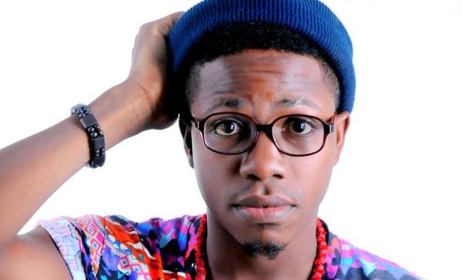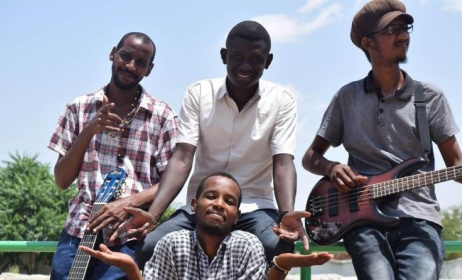Use of language in Northern Nigerian music
There are about 560 languages spoken in Nigeria, preserving – through their use in speech and music – the history and the cultural identity of the various tribes and regions they represent[1]. Long before music from Northern Nigeria became westernised and electronic sounds were added to its traditional instrumentations, language use was deeply rooted in the cultures and traditions of the people of this region. This article provides an overview of the use of language in Northern Nigerian music.
 Jeremiah Gyang. Photo: Facebook
Jeremiah Gyang. Photo: Facebook
Language use in traditional Northern Nigerian music
Most traditional musicians in Northern Nigeria either inherit the trade from their parents or apprentice with a popular singer before becoming independent artists. The music often involves free, open-playing styles and improvisation; by extension the language used during the writing process of traditional songs is often spontaneous and colloquial. Such songs often speak of everyday life: triumphs and challenges are celebrated and addressed, while metaphors drawn from folktales are used to mirror situations and figures from the society concerned[2].
The use of language in traditional Northern Nigerian music is, furthermore, both poetic and dexterous. Sometimes – as with the southern igoru musical tradition[3] – well-known proverbs are used as vehicles for satire, and hyperbolic language is employed to ridicule embarrassing situations. The songs might feature mild or explicit content depending on their intended audience, exploiting the fact that although young and old people listen to the same songs, their understanding of the language being employed will differ.
Language use in contemporary Northern Nigerian music
Hip hop is the most prominent form of contemporary music in Northern Nigeria. It is most often associated with the Hausa language, the lingua franca of West Africa spoken by more than 35 million people in such countries as Ghana, Niger, Cameroon, Sudan, Benin and Togo[4]. However, despite the dominance of Hausa – an Afroasiatic language of the Chadic branch[5] – other Northern Nigerian languages are still well represented. Some of the other languages artists use include Birom (Jos State); Nupe (Niger); Atyap, Juu, Gbagyi, Ikulu, Marwa, Shyeolio, Kaninkon and Oegworok (Kaduna State); Fulfulde, with its various dialects found in the core northern states; Kanuri (Borno, Yobe and Jigawa states); Idoma (Kogi) and Igala (Benue State)[6].
The creolisation of indigenous tongues in Northern Nigeria has aided communication and helped artists to garner mass appeal and commercial success. While artists have historically always been able to gain followers in their home-language regions, they now also incorporate phrases, proverbs, slang words and chants used in other languages to appeal to more fans. Contemporary folk musicians like Abdullahi Useni, who sings in five different languages, possess linguistic versatility that has resulted from travelling around and performing to different audiences in the region[7].
While some musicians from Northern Nigeria still sing solely in their mother tongues, those who use languages from a mix of different tribes and regions have proved most popular in recent years. Jeremiah Gyang, who is often credited with bringing mainstream attention to contemporary Northern Nigerian music, uses a combination of Birom, English and Hausa[8]. His albums Na Ba Ka, I Give You and The Love Album blend these three languages. Gyang’s syncretic use of language in his performances, moreover, typifies the multicultural and ethnically diverse composition of Northern Nigeria[9].
Similarly, popular singer 2Baba, born Innocent Idibia in Benue State, uses a mixture of English, Pidgin and Idoma in a number of his songs. Although most of his songs are in English or Pidgin, tracks like 'Nfana Ibaga' (No Problem) and 'Odi Ya' from his 2002 album Face 2 Face contain a combination of Western and traditional lyricism[10].
Finally, although he hails from the Bazuli minority tribe in Bauchi State, rapper ClassiQ is a prime example of a Northern Nigerian musician who has mastered the art of mixing Hausa metaphors with English or Pidgin expressions[11]. His work exemplifies a trend in Northern Nigerian hip hop to include the use of words in local dialects, which are then interpreted with a rhyming equivalent in English (and vice versa). The lyrics to ClassiQ's single 'Ban Son Raini' (I Don’t Want Disrespect) illustrate this perfectly: ‘Ga lapazi, ga effizzy / Wallahi na sa haters na suna jiri, they are dizzy / Abubuwa sun man yawa, being me is not easy / So don Allah ka game, has in na ce make I am busy.’ The success of this style has earned ClassiQ collaborations with mainstream rappers like Vector.
Conclusion
The trend of Northern Nigerian musicians incorporating and blending languages has led to commercial success and the creation of a new sound in recent years. The use of regional languages has, furthermore, allowed these musicians to re-establish and celebrate their roots and in the process enrich the cultures of Northern Nigeria.
Resources and citations:
- [1] Udeh, C. 2017. 15 Most Widely Spoken Nigerian Languages. December 5. Buzz Nigeria: https://buzznigeria.com/top-15-widely-spoken-nigerian-languages/
- [2] Lasisi, SA. 2012. Traditional Music in Nigeria: Example of Ayinla Omowura’s Music. www.iiste.org: http://pakacademicsearch.com/pdf-files/edu/449/108-118%20Vol%202,%20No%2...(2012).pdf
- [3] Idamoyibo, OI. 2006. Igoru Music In Okpeland: A Study Of Its Functions And Compositional Techniques. University of Pretoria: https://repository.up.ac.za/bitstream/handle/2263/24078/Complete.pdf?sequence=13
- [4] Huasa Language in Wikipedia. Last accessed 27 June 2018: https://en.wikipedia.org/wiki/Hausa_language
- [5] Afrosiatic Languages in Wikipedia. Last accessed 27 June 2008: https://en.wikipedia.org/wiki/Afroasiatic_languages
- [6] Okafor, O. 2016. Hausa Language: 4 Interesting Things You Should Know About Nigeria’s Most Widely Spoken Indigenous Language. Pulse. June 6: http://www.pulse.ng/lifestyle/food-travel-arts-culture/hausa-language-4-...
- [7] Chimaobi, K. 2016. Meet The Hausa Musician That Sings In Almost All The Nigerian Languages. NB Nigerian Bulletin. February 12: https://www.nigerianbulletin.com/threads/meet-the-hausa-musician-who-sin...
- [8] Abubakar, NL. 2008. Nigeria: Where Has Jeremiah Gyang Been? The Daily Trust: http://allafrica.com/stories/200807120024.html
- [9] Gyang, J. Why I Shunned Lagos and Relocated to Jos. The Guardian Nigeria: https://guardian.ng/saturday-magazine/why-i-shunned-lagos-and-relocated-...
- [10] Greenstreet, M. 2baba Talks: The Future Is Bright For Nigerian Music. Afropop Worldwide: http://afropop.org/articles/2baba-talks-the-future-is-bright-for-nigeria...
- [11] Bivan, N. 2016. Rapping In Hausa, My Ticket To Stardom. Daily Trust Newspaper: https://www.dailytrust.com.ng/news/weekend-mag/story/174242.html
This article is part of the Music In Africa Connects project, a multi-faceted development initiative aiming to support the music sectors of African countries affected by conflict. To find out more about Music In Africa Connects, click here.
Disclaimer: Music In Africa's Overviews provide broad information about the music scenes in African countries. Music In Africa understands that the information in some of these texts could become outdated with time. If you would like to provide updated information or corrections to any of our Overview texts, please contact us at info@musicinafrica.net.
Editing by David Cornwell


























Commentaires
s'identifier or register to post comments